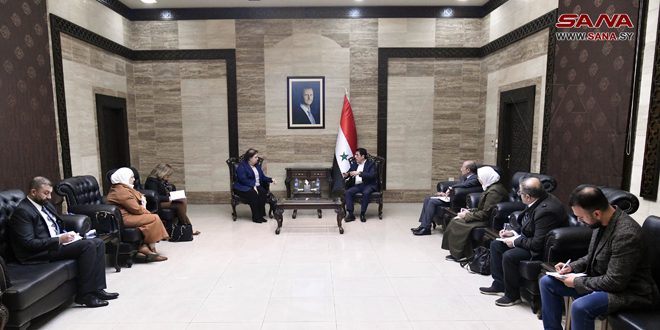Foreign and Expatriates Minister, Dr. Faisal al-Mekdad, received on Monday the UNICEF Regional Director in the Middle East and North Africa, Adele Khader, and discussed the organization’s domestic and regional activities with her.
Both sides also discussed the impact of multiple global crises on children, their health and education, and the need for intensive global efforts to confront such impacts.
Mekdad stated the deep effects of the terrorist war and the inhumane economic sanctions imposed by Western countries on various sectors in Syria, especially on education, health and children, pointing out that wars have always had a disastrous effect on children and women, which means that the competent organizations and bodies concerned with children’s rights, especially UNICEF, have exerted more efforts to provide support to these children and help them overcome these effects and challenges.
Mekdad appreciated the organization’s efforts in cooperation with the Syrian national authorities and the relevant ministries to provide support to children in Syria, stressing the importance of increasing work on early recovery projects, especially the rehabilitation and restoration of schools and health institutions that were destroyed by terrorist groups in various Syrian regions, affirming the great attention given by the state Syrian for children.
In turn, the regional director of the organization appreciated Syria’s support in facilitating the organization’s activities, praising the high level of coordination and cooperation reached by the organization’s relationship with all national partner authorities in its projects and the facilities that the organization enjoys to implement its humanitarian projects and programs.
Ghabash
Health Minister, Dr.Hassan al-Ghabbash, discussed Monday with the Regional Director of the United Nations Children’s Fund organization (UNICEF) in the Middle East and North Africa, dele Khodr and her accompanying delegation, means to enhance health cooperation.
Ghabbash highlighted the importance of coordination regarding the priorities of the health sector for the upcoming stage and the need to intensify efforts.
For her turn, Khader voiced her appreciation for the work carried out by the Ministry, especially regarding combating cholera, and the efforts made that led to a decrease in the number of infections, underscoring, “UNICEF is ready for further coordination and cooperation to serve the health of citizens.
COMMENT FROM THE OBSERVER
The Syria Response Coordinators Team slammed Khader’s visit and talks with the government officials.
The team said in an official statement that the northern regions of Syria had not witnessed this type of visit by officials from United Nations agencies over the course of the Syrian humanitarian crisis that has been going on for eleven years now.
These visits, according to the statement, “ignore the reality of the children in the camps for the displaced in the northwest, whose number exceeds 1,017,871 children, equivalent to 56% of the camp residents.”
The team’s statement accused the UN official of ignoring the suffering of children in northwestern Syria in general and the camps in particular.
This article was edited by The Syrian Observer. The Syrian Observer has not verified the content of this story. Responsibility for the information and views set out in this article lies entirely with the author.


